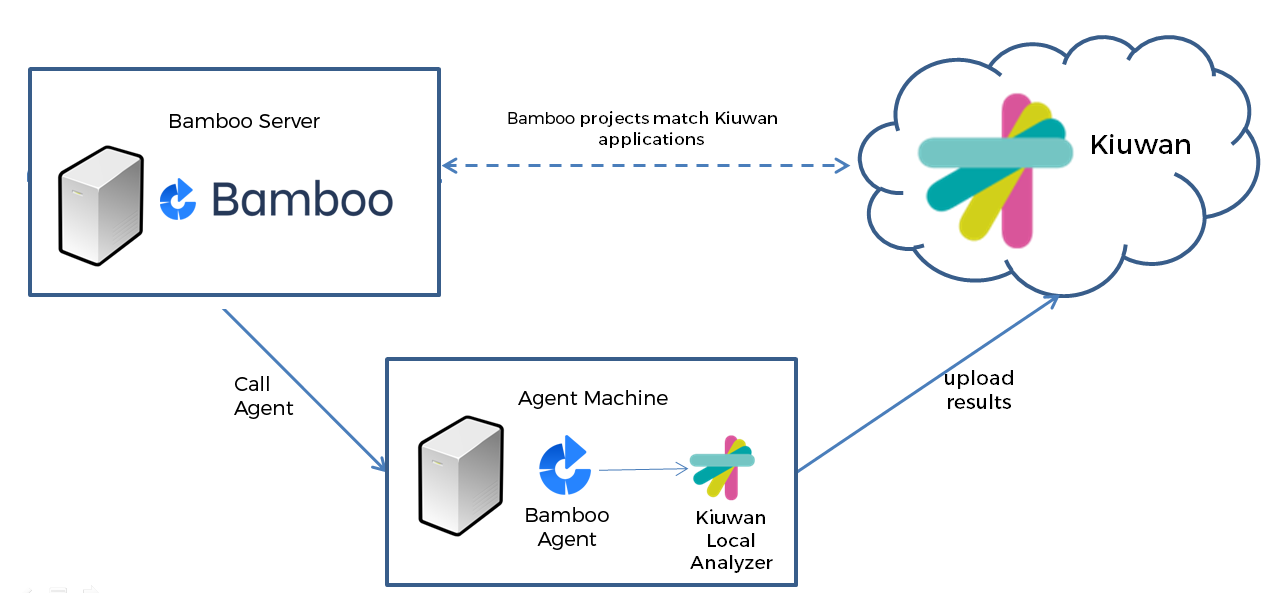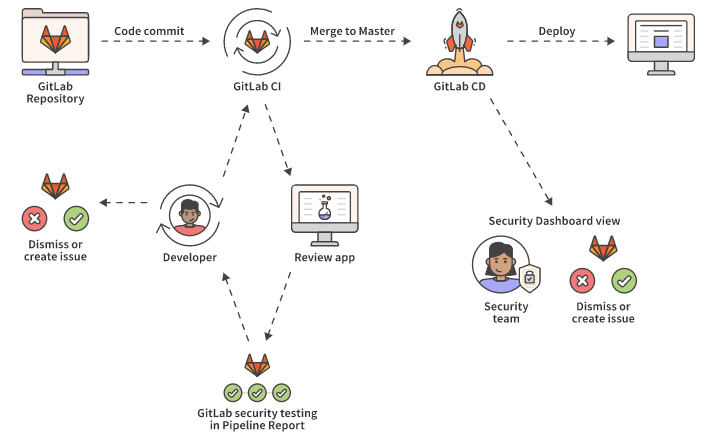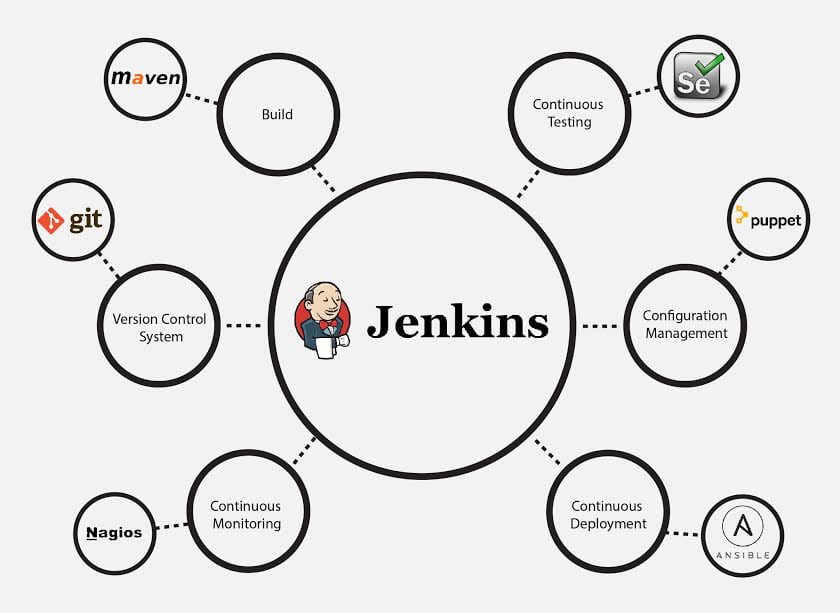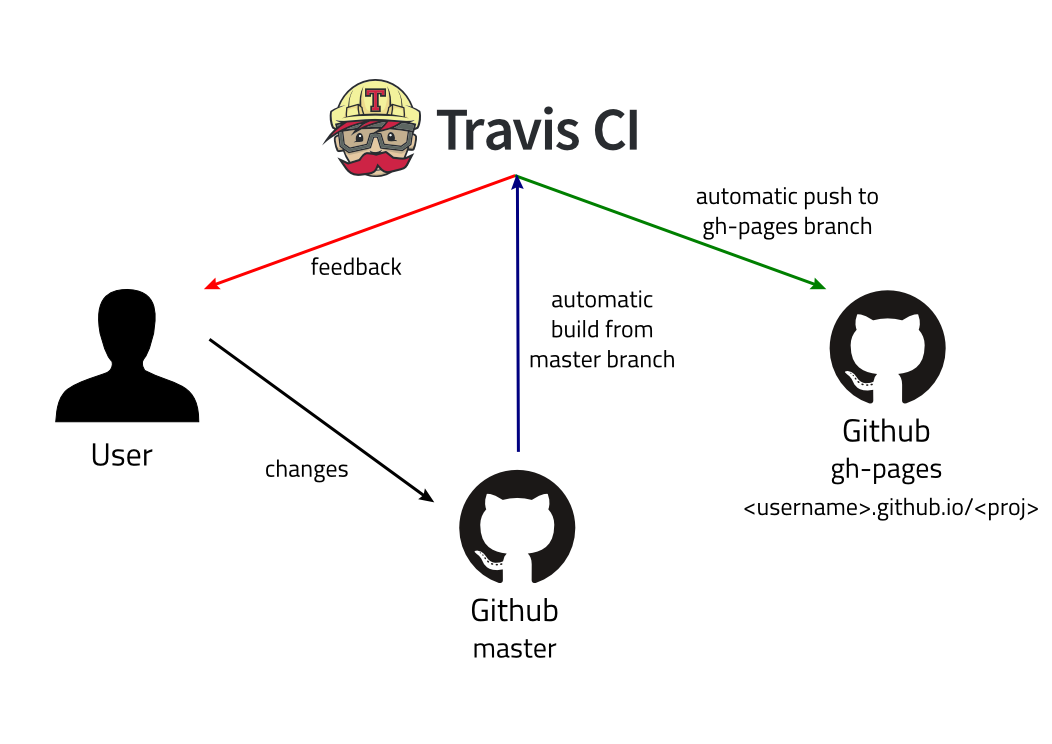CI/CD is a method to frequently deliver apps to customers by introducing automation into the stages of app development. The main concepts attributed to CI/CD are continuous integration, continuous delivery, and continuous deployment. CI and CD stand for continuous integration and continuous delivery/continuous deployment. In very simple terms, CI is a modern software development practice in which incremental code changes are made frequently and reliably. Jenkins is undoubtedly the most well-known tool for building CI/CD pipelines. A robust, open-source project, Jenkins has a devoted community worldwide.

What is CI Tools?
Continuous integration (CI) is the practice of automating the integration of code changes from multiple. Developers input code into their private terminals. After that is done, they commit the changes to the shared repository. The CI server monitors the repository and analyses changes as they occur. contributors into a single software project. Software developers often work in isolation and therefore the advent of CI is a great practice when working in a team because prior to the emergence of Continuous Integration, it took days or even weeks for software developers to integrate their code and also to merge changes from different branches of code. These long periods of time created many merge conflicts, stubborn bugs, code strategy divergence and duplicated effort. CI requires the team’s code be merged to a shared control branch, continuously, to avoid these problems.
How Does Continuous Integration Work?
- Developers input code into their private terminals.
- After that is done, they commit the changes to the shared repository.
- The CI server monitors the repository and analyzes changes as they occur.
- Continuous Integration builds the system and runs unit and integration tests.
- The server also releases deployable artefacts for testing.
- The CI server assigns a build tag to the version of the code it just built.
- The Continuous Integration server gives the team reports of the successful build.
- If the build or tests fail, the server alerts the development team.
- The team will fix the issues as soon as is possible.
- It continues to integrate and run tests throughout the entire project.
What is CD Tools?
A CD tool should allow you to incorporate your existing test automation (regression testing, etc.) into a pipeline. Change Management, Governance, and Approvals – This step is how a company designates what’s ready to be deployed to production. Continuous Delivery is the process of deploying build artifacts into an environment. An example of an artifact is a docker container, and the environment could be for testing or for production.
Continuous Delivery tools help create pipelines to standardize releases. Fundamentally, pipelines can be broken down into five stages:
- Testing and QA
- Change Management, Governance, and Approvals
- Deployment Strategies
- Verification
- Rollback
Benefits of CI Tools?
Continuous integration (CI) is the practice of automating the integration of code changes from multiple contributors into a single software project. It’s a primary DevOps best practice, allowing developers to frequently merge code changes into a central repository where builds and tests then run.
Top 10 Benefits of Continuous Integration and Continuous Delivery
- Smaller Code Changes
- Fault Isolations
- Faster Mean Time To Resolution (MTTR)
- More Test Reliability
- Faster Release Rate
- Smaller Backlog
- Customer Satisfaction
- Increase Team Transparency and Accountability
- Reduce Costs
- Easy Maintenance and Updates
Benefits of CD Tools?
Continuous Integration (CI) allows you to continuously integrate code into a single shared and easy to access repository. Continuous Delivery (CD) allows you to take the code stored in the repository and continuously deliver it to production. CI/CD creates a fast and effective process of getting your product to market before your competition as well as releasing new features and bug fixes to keep your current customers happy.
Top 10 Benefits of Continuous Integration and Continuous Delivery
- Automate the Software Release Process
- Improve Developer Productivity
- Find and Address Bugs Quicker
- Deliver Updates Faster
Top CI/CD Tools
- Bamboo
- Buildkite
- Circle CI
- CodeShip
- GitHub
- Gitlab
- GoCD
- Jenkins
- Shippable
- TeamCity
- Travis CI
Bamboo
Bamboo is a continuous integration (CI) server that can be used to automate the release management for a software application, creating a continuous delivery pipeline.
Bamboo is an automation server used for Continuous Integration. Developed by Atlassian in 2007, this tool allows the developers to automatically build, document, integrate, test the source code and prepare an app for deployment. It is used to automate the build, test, and release management for a software application, creating a continuous delivery pipeline.

Buildkite
The Buildkite agent is a small, reliable and cross-platform build runner that makes it easy to run automated builds on your own infrastructure. Its main responsibilities are polling buildkite.com for work, running build jobs, reporting back the status code and output log of the job, and uploading the job’s artifacts. Buildkite is a continuous integration and deployment platform, helping you automate and scale the testing and delivery of all your software projects. Buildkite is free to use for open source projects. You can start out on our Free plan, and if you need additional usage or inclusions for your open source project, you can email support and we’ll be happy to help.

Circle CI
CircleCI is a cloud-based CI/CD tool that automates installation and delivery procedures. It offers quick configuration and maintenance without any complexities. CircleCI is a lightweight cloud-based continuous integration and delivery platform that automates build, test and deployment processes. It supports Ruby on Rails, Sinatra, Node, Python, PHP, Java, and Clojure. CircleCI is the continuous integration & delivery platform that helps the development teams to release code rapidly and automate the build, test, and deploy. CircleCI can be configured to run very complex pipelines efficiently with caching, docker layer caching, resource classes and many more.

CodeShip
Codeship is a cloud-based application development platform that helps businesses with continuous integration and deployment of applications such as Node.js, Ruby, PHP and Python. Designed for small to large businesses, the platform allows users to customize web apps and automate serverless platforms. A CI tool that supports GitHub, Gitlab and Bitbucket projects. It is present in Basic and Pro versions, which differ in price and have own variations. The major functions are deployment and control of the design of CI and CD systems. Codeship’s free plan allows 100 builds per month and five private projects. Unlimited builds and projects begin at $49 per month. Yearly plans give you two months free. Nicely, educational projects receive a 50% discount, and open source projects can use Codeship for free.

GitHub
GitHub is a Git repository hosting service, but it adds many of its own features. While Git is a command line tool, GitHub provides a Web-based graphical interface. It also provides access control and several collaboration features, such as a wikis and basic task management tools for every project. GitHub is a code hosting platform for version control and collaboration. It lets you and others work together on projects from anywhere. This tutorial teaches you GitHub essentials like repositories, branches, commits, and pull requests. GitHub today announced that all of its core features are now available for free to all users, including those that are currently on free accounts.

Gitlab
GitLab is The DevOps platform that empowers organizations to maximize the overall return on software development by delivering software faster, more efficiently, while strengthening security and compliance. GitLab provides Auto DevOps, which are prescribed out-of-the-box CI/CD templates that auto-discover the source code you have. Based on best practices, they automatically detect, build, test, deploy, and monitor your applications. GitLab is a web-based Git repository that provides free open and private repositories, issue-following capabilities, and wikis. It is a complete DevOps platform that enables professionals to perform all the tasks in a project—from project planning and source code management to monitoring and security.

GoCD
GoCD is an open-source tool which is used in software development to help teams and organizations automate the continuous delivery (CD) of software. It supports automating the entire build-test-release process from code check-in to deployment. GoCD is a good tool for creating simple, automated workflows; not necessarily about deployments but focusing on the workflow. It is a strong continuous integration tool, but has some shortfalls when it comes to continuous deployments. GoCD is an open-source tool which is used in software development to help teams and organizations automate the continuous delivery (CD) of software. It supports automating the entire build-test-release process from code check-in to deployment.

Jenkins
Jenkins is a popular open source tool for CI/CD that is free to use. While you may need some server administration skills to configure and monitor Jenkins, there are many advantages to consider. The Jenkins project includes a large plugin ecosystem, the community around it is thriving and it is actively. Jenkins is a popular CI orchestration tool. It provides numerous plugins for integration with multiple test automation tools and frameworks into the test pipeline. When it comes to test automation, Jenkins provides plugins that help run test suites, gather and dashboard results, and provide details on failures.developed.

Shippable
Shippable is a hosted cloud platform that provides hosted continuous integration deployment and testing to GitHub and Bitbucket repositories. Shippable’s continuous integration service is built using Docker.

TeamCity
TeamCity is used to build and test software products in an automated manner. It provides rapid feedback on every code change, reduces code integration problems, and leads to more effective teamwork. Many popular games, websites, banking systems, and all of JetBrains products are built with TeamCity. Teamcity is a build tool. It is a java based management and continuous integration server that is licensed under the javabite. It is mainly focused on build automation due to which it is can be used anywhere without any hassle. TeamCity is a user-friendly continuous integration (CI) server for professional developers, build engineers, and DevOps. It is trivial to setup and absolutely free for small teams and open source projects.

Travis CI
Travis CI was the first CI as a Service tool. It introduced a new approach to building code in the cloud. This CI tool allows the user to sign up, link their repository, build, as well as test their apps. Travis CI tool can easily integrate with the common cloud repositories like GitHub and Bitbucket. Travis CI is an open-source hosted distributed continuous integration service used to build and test projects hosted at GitHub. Travis CI is configured by adding a file named . travis. yml which is a YAML format text file to the root directory of the GitHub repository. GitHub, Slack, MySQL, npm, and Amazon S3 are some of the popular tools that integrate with Travis CI. Here’s a list of all 88 tools that integrate with Travis CI.

- How to become a devops freelancer - July 15, 2023
- DevOps Support Services Market in India - July 15, 2023
- 5 Key Considerations Before Embarking on An App Development Project - July 14, 2023

